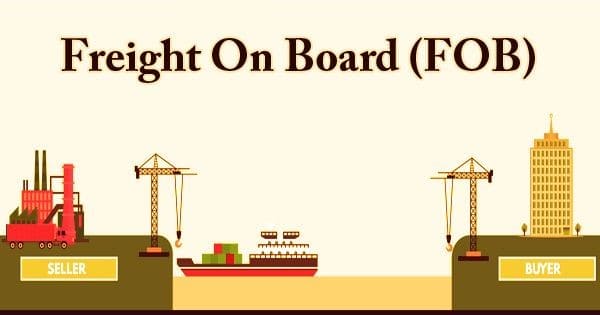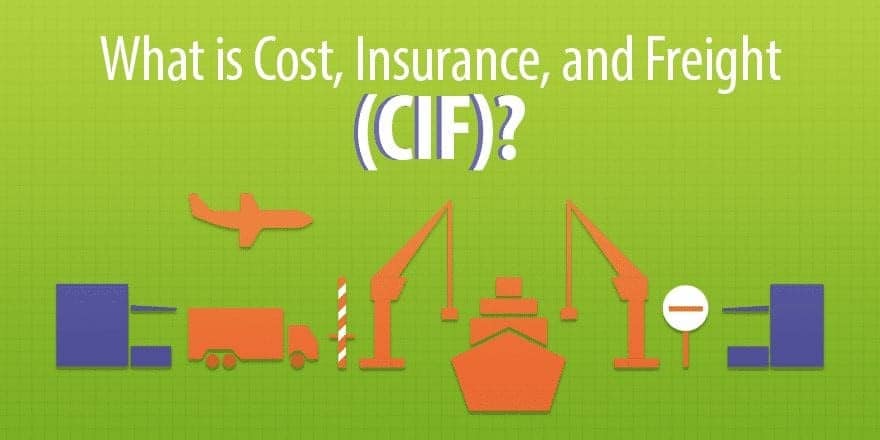Whenever someone purchases or sells items with the state, both parties, the buyer and the seller, must get to know the terms for moving those items to their destination. CIF and FOB are mainly known and used as agreement models for shipping at a foreign level. All types of agreement specify which party is liable for the items and the point at which responsibility transfers from the seller to the buyer.
With the help of a FOB shipping, accountability and liability transfer from the seller to the purchaser when the shipment reaches the port or other facility selected as the point of origin. By using a CIF agreement, the seller pays costs and assumes accountability until the items arrive at the chosen destination port picked by the purchaser.
From this article, you will know the significant difference between FOB and CIF and why they are essential for your business.
What is FOB and What Does FOB Mean in Shipping?
FOB stands for Free On Board. With the help of this type of shipping agreement that falls under FOB, the seller or shipper plans for the items to be shipped to a chosen point of origin. Mostly this is a port because FOB and other INCOTERM contracts are majorly planned for maritime shipping.
Though, FOB contracts are also utilized for inland and air shipments. Delivery is achieved whenever the seller leaves the items to the purchaser. It contracts to stipulate that this happens when the goods cross the rail of the ship.
Here the purchaser can negotiate a cost-effective price for the cargo and insurance with a carrier of their choice. The truth is that some international traders look to build up their profits by purchasing FOB and selling CIF.

What is FOB Price?
The FOB price of imports and exports of products is the market value of the items at the point of uniform valuation. Which is the customs border of the financial state from which they are exported. In simple words, here, the seller states a price, such as the cost of delivering products to the nearest port.
The purchaser deal with the shipping charges and is liable to get the items from that port to their final destination. It is something like the CIF price, but less than the costs of transportation and insurance charges. Between the customs border of the exporting state and that of the importing state.
Why Using FOB?
For most shippers, FOB is the most commonly suggested sale term. Why exactly is that? Because it permits massive control over both the cargo itself and the costs of it. When the buyer can choose their cargo carrier, they ultimately have more control over the shipment, selecting the way to be taken and transportation time.
They then have the advantage of working with one firm throughout the process of transportation. That means one central point of contact for any issues or quarries that may pop up. Working with a single further ensures that the courier will keep in mind the customer’s best interest since their only purpose is to deliver the cargo to the destination.
Why not Using FOB?
Most of the time, you will find that the unit prices of items to be given under FOB terms are more than if you’re looking at Ex Works shipments. This doesn’t always mean the entire cost will be higher, as this price contains some cargo for costs.
You can’t be sure you’ll get the finest accessible deal because you don’t have control over the arrangement for getting your items to the port in the country of origin. You might find that the distributor includes a percentage of the actual prices and keeps it as their benefit.
What are the Responsibilities of a Seller Under FOB?
- Cost of packaging the transported products.
- Additional charges for loading the items on the trucks and shipping the items to the seller’s port.
- Export taxes, customs duty, and other expenses.
- Any transfer, picking up, and loading charges interlinked with loading the item onto the ship.
What are the Responsibilities of a Buyer Under FOB?
- Cargo charges are interlinked with delivering the cargo from the seller’s port to the purchaser’s destination port.
- The Cost of protecting the cargo, but the purchaser has the option of not buying insurance.
- Costs of unpacking the shipment at the purchaser’s port and shipping it to the final destination.
- Any additional import duties, taxes, and costs interlinked with clearing customs.
What is CIF and What Does CIF Mean in Shipping?
CIF’s abbreviation is Cost, insurance, and freight, known as an international shipping agreement, which states the charges paid by a supplier to deal with the costs, insurance, and freight of a purchaser’s order while the shipment is on the way for delivery.
Cost, insurance, and freight only implement items moved through a waterway, sea, or ocean. The products are transported to the purchaser’s port named in the sales contract; till the items are delivered to the purchaser’s destination port; the seller covers the costs of any loss or damage to the item.
Apart from that, if the product needs extra customs duties, export paperwork, examination, or rerouting, the supplier should cover these costs. Once the products have reached the purchaser’s destination port. The buyer assumes liability for any fees or charges for unloading and shipping the freight to the final destination.

Why Using CIF?
CIF is thought to be a better way to purchase items for those new to international trade. It might also be a better option for new traders who have small shipments. In CIF, the salesperson is accountable for shipping the items to the closest port, loading the products on the cargo, and paying for the items to be delivered to a port picked by the buyer.
The seller is also liable for paying insurance for the items. When the shipment has been sent to the purchaser’s destination port. The buyer assumes liability for the costs of bringing in and delivering the items. Here the risk transfer comes out from the seller to the purchaser when the items have been loaded on the vessel.
Why not Using CIF?
On CIF, it is the salesperson that picks the freight forwarder. They choose the most reasonable options within the current contract, which may not always be appropriate for the carrier. For example, negotiating with the other party is the sole option if they wait for delivery at a particular time or express shipment.
By doing it, they can convince the contractor to go for their chosen conditions. At times the CIF basis is abused for air or rail transportation. In this situation, you must keep in mind the issues at the customs border. Customs do not identity transport on the CIF by any source of shipment other than ships. The change of the mode of transport may result in several days at the customs border.
What are the Responsibilities of a Seller Under CIF?
- Buying export licenses for the item.
- Offering inspections of products.
- Any extra charges or costs for shipping and loading the products to the seller’s port.
- Packaging charges for exporting the shipment.
- Fees for customs clearance, duty, and taxes.
- Charges of protecting the delivery up until the purchaser’s port of destination.
- Covering the Cost of any harm or destruction to the items.
What are the Responsibilities of a Buyer Under CIF?
- Unpacking the item at the port of the terminal.
- Shipping the item within the terminal and to the delivery site.
- Custom duty charges are interlinked with importing the products.
- Charges for shipping, unloading, and delivering the items to the final destination.

FOB Versus CIF
Below are some significant differences between FOB and CIF. So have a look and decide on your own which one suits your business needs. We hope that these will help you in differentiating between cif vs fob in a better way.
Shipping
In FOB transport, the purchaser is accountable for booking a ship to reach the final destination. In CIF transport, the salesperson is solely liable for finding a ship.
Claim on Goods
In FOB, the salesperson has no right of claim on the items and the right of termination in transit; The delivery company is accountable to the purchaser. But in CIF, the seller has the right of claim on products as well as the right to stop in transit because the seller has contracted the cargo company.
Insurance
One of the significant differences between FOB and CIF is the insurance of the items as in FOB. The salesperson does not have to buy insurance or the items, whereas, in CIF, the seller requires to sign an insurance contract for the products. Which gives a policy of insurance of at least 110% of the value of the goods.
Costs
Going with the FOB option for transporting is suggested as the purchase gets control over the delivery process and the charges are cheaper. Though in CIF shipping, since the seller has the right over delivery charges and planning a ship with the guidance of a shipment forwarder, the Cost is higher.
Risk
When it’s FOB delivery, the purchaser is supposed to cover all the risk of the damages or loss of the products, whereas, in CIF shipping, the seller is accountable to deal with all the charges or the loss of broken items.

Advantages of Using FOB Agreement
- The salesperson knows the details of his state and can freight the items by keeping in mind the terms and conditions of the shipment company.
- The buyer deals with the shipping document as they are the one who chooses the delivery carrier and gets to keep payment documents that have been made for shipment transportation.
- If a purchaser cannot clear payment, then the seller can recover the products before they give them to the buyer, even if it is in shipment.
- FOB is an excellent logistic way as it ensures a secure manner and reasonable costs.
- An essential advantage of Free On Board or FOB is that there are no hidden additional charges in the process.
- It is considered a customary agreement by most purchasers and sellers and thus has enormous acceptance.
Disadvantages of Using FOB Agreement
- The purchaser has to face the risk and responsibility of broken items if they have signed a Free On Board shipping point contract. They will cover any unexpected outcomes even if the items do not reach them.
- In some cases, the seller includes margin costs to their Free On Board costs.
- The salesperson is liable for damages if they have signed Free On Board destination.
- If the purchaser does not name a productive ocean carrier, the seller will not recover the cost of the items.
Advantages of Using CIF Agreement
- If the purchaser is unsure of the item’s export requirements, CIF forces the salesperson to ensure that their items can be exported correctly. This can be beneficial when shipping risky products and buying in states whose terms and conditions are not appropriately stated.
- In case of any unexpected misfortune at sea, including damage caused by bad weather conditions or piracy, insurance is given by the seller can help you deal with some of the losses.
- When a purchaser has a current relationship with a third-party logistics firm that can deal with importing and domestic shipments. CIF permits the buyer to use the funds they have without looking for new capital in the origin country.
Disadvantages of Using CIF Agreement
- When a purchaser depends on a seller to deal with any aspect of the shipping process, they are at the risk of increased prices. In some states, commissions are standard, which can be a reason for higher shipping charges.
- All import duties, taxes, and obligations are the purchasers because the seller is needed to get insurance, the cost of insurance and shipment is baked into the sale price. They have to pay customs duty and taxes on the item’s price and the Cost of cargo and insurance.
- All risk is assumed once the items are on board the cargo vessel. When any issues pop up during the shipping process, the purchaser is liable for dealing with the losses, not the seller.
- The purchaser is accountable for paying the destination handling costs, though, and it can create an extra hidden cost unless stated in advance. There are times when delivery companies shipping for users under CIF terms will increase the destination handling costs for the purchasers because this is an inevitable cost.
Final Word
Both FOB and CIF are important for buyers and sellers in one way or another. We hope that this article will help you get to know which type of agreement suits your needs in the best way possible. Let us know if you have any other quarries regarding both types of shipment contracts.
